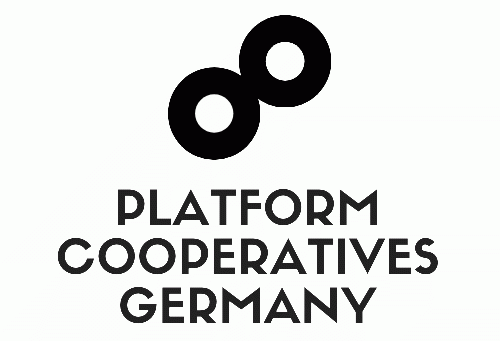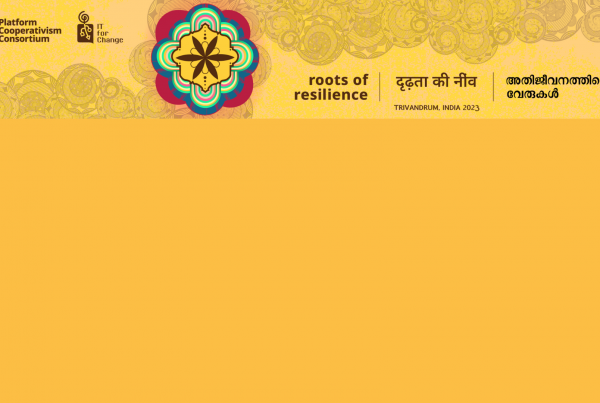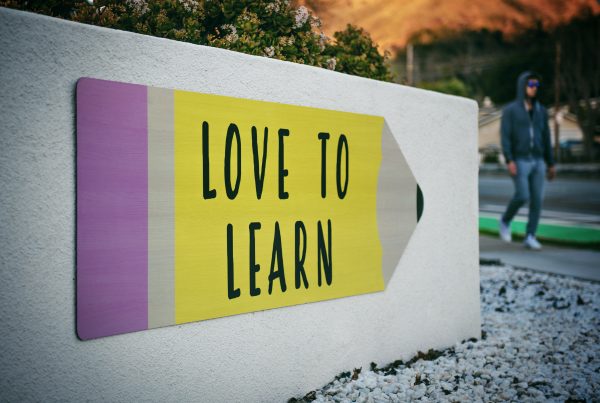This text is about how to rethink the traditional notion of cooperatives to make them a viable legal and organisational form to tackle the challenges of our future.
What is a cooperative?
A cooperative, as Wikipedia puts is, is an „autonomous association of persons united voluntarily to meet their common economic, social and cultural needs and aspirations through a jointly owned and democratically-controlled enterprise“.
And what is a platform cooperative?
A platform cooperative is basically a cooperative built around a digital service or a digital platform, which is democratically controlled and co-owned by its members. The legal form of these organisations is very often based on the cooperative model, but due to its digital business model and potentially global membership it very often leaves the realm of the local, where many cooperatives traditionally reside. I will come back to this point later, so you will get a chance to understand better why platform cooperatives require a special strategic approach – both from a political and organizational perspective.
Our main work at Platform Cooperatives Germany is to help co-founding and co-funding cooperative businesses that have very special needs in terms of governance, international membership, digital business model or collaboration across different jurisdictions. Many of the organisations we helped to co-found are unique in a variety of ways – be it for instance Circles, a universal basic income on the blockchain, or SuperCoop, a cooperative supermarket where members do all the work themselves or a program dedicated to workers’ buyout to ensure continuation of businesses that would otherwise cease to exist.
We tend to frame our work as co-founders or „co-risk takers“ rather than just simply consultants. Many of the organisations we work with wouldn’t have a chance to establish themselves without others who are actively engaged and willing to make their hands dirty on all levels of both operational and strategic work. It’s not enough to just give good advice. Most platform cooperatives are doing pioneering, groundbreaking work and need ecosystems that go beyond the legacy startup accelerator infrastructure. I dare to say: It literally takes a village to build up a platform cooperative.
How it started & how it’s going
After having launched the platform cooperatives movement in Germany some years ago, we have received funds from both private organisations and the German Ministry of Economy to build an innovation network for the platform cooperatives sector. In this first step, we have managed to bring various cooperative enterprises in Germany together, with some of them starting to collaborate until today.
During this initial period, we got a glimpse of the diverse needs and circumstances of platform cooperatives and developed a deeper understanding of both their challenges and their potentials. We have then moved on with doing a lot of individual consultancy, especially within the framework of the Social Economy Berlin program, a special fund that the Berlin municipality has put up in order to strengthen the sector of social economy businesses in Berlin.
Now, three years later, we received funds via the REACT with impact – Promoting Social Entrepreneurship Program through the European Social Fund in Germany. The goal of this program, which by the way still accepts submissions, is to help make the economy for the common good more sustainable. We are thankful and honored for the opportunity to be part of this endeavor and we intend to use the coming months to build the prototype of a digital co-op platform that allows co-op founders to tackle funding, governance, community building and business modeling with the help of both p2p consultancy and technical tools. We would like to use the opportunity to present our plans for the coming months, under the motto: rebuild co:op!
rebuild co:op refers to the very specific requirements that platform coops have in the overall cooperative sector and we gladly present our findings in the following overview.
rebuild co:op is based on the following propositions:
Inter-Cooperation
Remember the 6th cooperative principle, which was put forward by the International Cooperative Alliance? Platform cooperatives need a larger infrastructure that supports inter-cooperation. If platform cooperatives start to work with one another, they do not only strengthen one another by building economic loops, but they also get a chance to collectively outsource for instance legal advice, taxation or community building and collectively build knowledge on these novel fields. In doing so, they build capacity not just for themselves, but also for their partner organizations in the sector – thus stabilizing all parties involved in the long run.
Community-Based Funding
How realistic is it that a platform cooperative is able to compete within the market-driven digital economy? Given the unprecedented concentration of money, power and data that we currently see in the global economy, a platform cooperative can only thrive if it has the capacity to unlock its biggest potential: The power of community. There are many different ways a platform cooperative is able to raise funds, and some of them are based on digital tools such as quadratic funding or retroactive funding mechanisms, or DAOs, but there is also a whole range of legacy funding instruments that each cooperative has from the ground up, and that’s of course the cooperative shares, or member credit or member guarantees.
If Platform Cooperatives understood that fundraising is not begging for money, but part of the DNA of every Coop, they will be able to sustain themselves with much more confidence and financial skills. Members are pooling their resources in order to do something together that they could not manage to do alone – that’s what a coop does, every day, all the time.
Planetary Cooperative Law
The cooperative law in Germany is mainly tied to traditional cooperatives that belong to a place or a region. Of course: a farmers coop or a housing coop is based on people knowing each other on a personal level and cultivating a specific form of membership that is based on the rhythms of living together on the same land. A platform cooperative however brings people together that might share the same goals and values, but have never met in real life. They might see each other in video conferences or community calls, or they might use the same digital voting tools, but of course their form of being together and deciding together is a completely different one. This has direct implications on the legal aspects of an organization, because, imagine, if people come from all sorts of countries and jurisdictions and co-own an organization, that brings up a very unique blend of complexities in terms of governance, legal liability, accountability and much more. We still have to know a lot about social coordination at scale, and with every new digital organization that is being founded, the need for a global cooperative legal framework is growing. There is still a lot of work to do in that sector.
Distributed Governance
Another high-level buzzword and closely linked to what I just said about the legal aspects, but I want to introduce the term more from an operational and cultural perspective. If we imagine decentralized networks of thousands of people, how do they best engage in collective steering of the organization? And this entails not just the binary yes or no-voting, but also the capturing of member’s sentiment at large. All the complicated nuances of doing things together, the potentialities for misunderstandings, the language barriers, the buzzwords that some people use while others might have no clue what they are talking about, the uneven levels of inclusion and diversity, and so much more. My personal take is: we are only just beginning to fully understand the challenges of governance in a networked world and we are starting to move beyond techno-solutionism, towards real human expression and collective steering. While we are taking the first baby steps in the right direction we have to remind ourselves that we are all learners and need to think of ways to share those learnings and make them accessible.
Open Tech
Open tech is essential for the sustainability of platform cooperatives, because it promotes transparency and democratic governance within these organisations. By using open-source software and hardware, platform cooperatives can reduce their reliance on proprietary systems, fostering greater control over their digital infrastructure and data. This empowers cooperative members to shape the platform’s development, ensuring it aligns with their values and serves the collective interests of the community. Open-source solutions enable the implementation of robust data protection measures, reducing the risk of exploitation and ensuring that user data remains in the hands of the cooperative, rather than being harvested for profit by third parties.
Organisational Design
Social coordination at scale is a primary task for platform cooperatives, and it relies heavily on robust organisational design.
This involves clariying roles, fostering trust, and allowing for specialisation, all of which are crucial for seamless coordination among a large and diverse membership base. Moreover, it ensures adaptability and responsiveness, enabling platform cooperatives to scale their operations while remaining attuned to the needs of their community. Clear communication and transparent decision-making processes further enhance their ability to coordinate actions at a societal level, upholding the cooperative’s core values and principles throughout the growth process.
What’s next
Over the next months, we aim at working out strategies on how to best address those very specific issues on a digital platform on which we can start experimenting with prototypes, people and networks that already do groundbreaking work in the field of platform cooperatives. We work towards gathering best practices and to invite interested colleagues and friends into testing tools and strategies together with us. Our goal is to build a real sandbox for trial and error, which can serve as a starting point for collective learning. Stay tuned for more info on rebuild co:op in the coming weeks!
If you want to be in touch with us please reach out to hallo@platformcoops.de.




